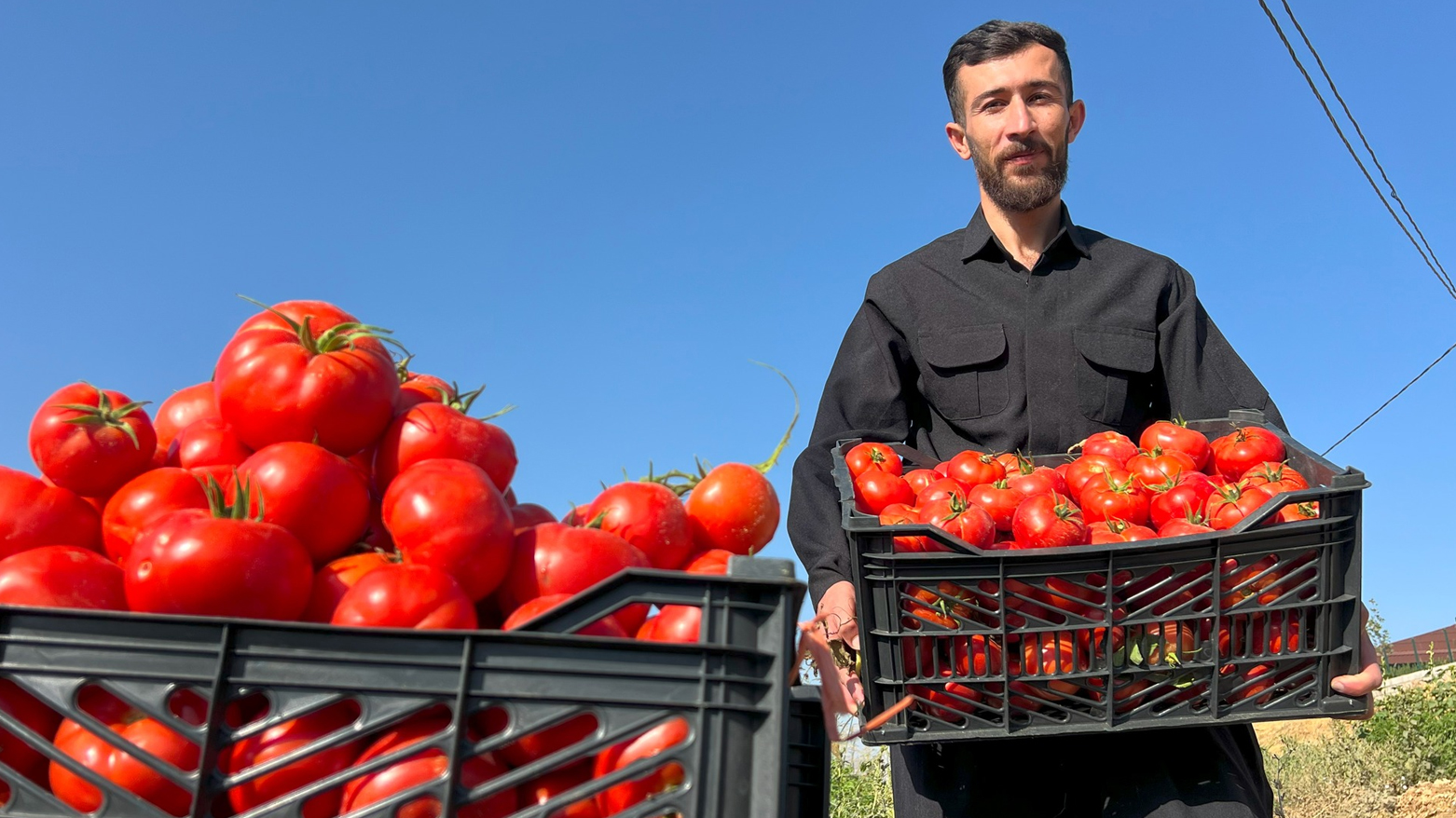Penjwen Tomato Harvest Supplies Markets Across Iraq
The Penjwen food distribution center has become a vital hub for marketing local produce. Omar Mahmood, a farmer, said he has cultivated dozens of acres of tomatoes, noting they are grown without harmful chemicals.

ERBIL (Kurdistan24) – Thousands of acres of tomatoes planted in the fertile plains of Penjwen district are being harvested this year, drawing buyers from the Kurdistan Region as well as central and southern Iraq.
The Penjwen food distribution center has become a vital hub for marketing local produce. Omar Mahmood, a farmer, said he has cultivated dozens of acres of tomatoes, noting they are grown without harmful chemicals. He added that workers from the Kurdistan Region and neighboring western Iran (East Kurdistan) assist daily with the harvest.
“After the harvest, workers rest in the fields before trucks arrive to load and distribute the tomatoes,” Mahmood told Kurdistan24.
Buyers have praised the quality. “Iraqis love these tomatoes, saying they are beautiful and delicious. If harvested quickly, they could supply the entire country,” said Hazim Ismail. Another buyer, Nasser Mohammed, called them “the best tomatoes sufficient for all of Iraq and Kurdistan,” while warning that Iranian tomato smuggling threatens local farmers’ livelihoods.
Tomato cultivation in Penjwen begins in late May, with harvesting lasting from early July until mid-November. Located about 100 kilometers from Sulaimani, the district includes three sub-districts and 188 villages, making it one of the most productive agricultural regions in the Kurdistan Region.
Meanwhile, other agricultural products are also reaching international markets. Traders in Akre announced that 45 tons of locally grown sumac are ready for export to Turkey, with demand extending to Europe and Asia. They noted that exports have raised local prices compared to last year.
Read More: Kurdistan Exports 45 Tons of Akre Sumac to Türkiye
In the Garmiyan independent administration, farmers are successfully cultivating high-quality dates that ripen earlier than those from other Iraqi provinces, adding to the Kurdistan Region’s growing agricultural diversity.
Read More: Garmiyan Dates Challenge Market Dominance with Superior Quality and Early Harvest
The Kurdistan Regional Government (KRG) has made agriculture a cornerstone of its economic diversification strategy. Over 3,000 tons of fruits and vegetables—primarily tomatoes, onions, and cucumbers—are exported daily to federal Iraq, with nearly 250,000 tons already shipped this season. Investments in modern farming, weekly farmers’ markets, and international partnerships with countries like the Netherlands are driving higher yields and new opportunities.
Read More: Kurdistan Farmers Export Over 3,000 Tons of Local Produce Daily, Agriculture Directorate Confirms
With increased exports, processing plants, and foreign investment, agriculture is emerging as a key pillar of the Kurdistan Region’s plan to boost food security, create jobs, and reduce dependence on oil.
This diversification not only strengthens the region's economy but also enhances its resilience against global market fluctuations. By prioritizing sustainable practices and modern techniques, the KRG is positioning agriculture as a long-term driver of growth, ensuring a stable and prosperous future for its people.
Unfortunately, due to severe drought and low rainfall, springs like Kani Qulka in Kurdistan Region's Raparin independent administration’s Bitwen Plain are drying up, forcing farmers to adopt innovative, water-saving irrigation technologies. Farmers are increasingly using "sonde barane" (rain hose), a system that sprays water evenly and efficiently, saving water, time, and labor while being affordable. This method allows one person to manage extensive land, significantly reducing water consumption compared to traditional furrow irrigation. Drip irrigation is also widely used by orchard owners to deliver water directly to the tree roots. The KRG supports these efforts by investing over 265 billion dinars in water infrastructure, including building nine new dams and 126 rainwater harvesting ponds, 23 of which are already complete. These initiatives demonstrate a proactive response to climate change, ensuring agricultural sustainability in the region.
Read More: Innovative Irrigation Helps Kurdistan Farmers Combat Severe Drought